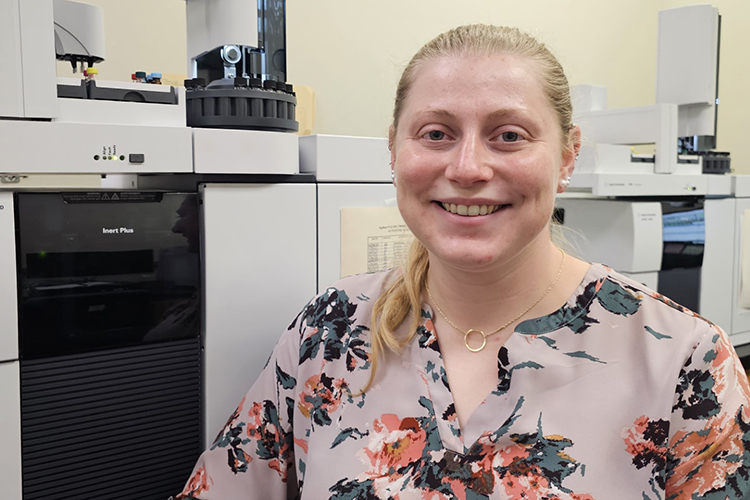It might be a small bag of white powder found on the floor of a suspect’s car. It might be some residue left on a dirty spoon in someone’s pocket. It could be a container of pills passed around at a nightclub.
Whatever form the substance takes, it’s Lexie Lanphere’s job to find out what it is.
Lanphere is a controlled substance analyst at the Wisconsin State Crime Lab’s Milwaukee office. Each day, she and her colleagues aid law enforcement and the state Justice Department by providing expert analysis of evidence recovered from crime scenes. The crime lab analyzes everything from fingerprints to gunpowder residue to DNA to, yes, controlled substances.
“These are actual, physical substances that are suspected to be drugs – powder, liquids, tablets,” Lanphere said. “(I look for) anything that is controlled under the Uniform Controlled Substances Act. …It has the different schedules, 1-5, where Schedule 1 is substances with a high potential for abuse with no accepted medical use, and Schedule 5 is substances with low potential for abuse and have medical uses in the state.”
Mass spectrometry or gas chromatography
When an illicit substance is recovered by law enforcement, it’s delivered to the lab where Lanphere’s supervisor determines which analyst will handle the case. When she gets an assignment, Lanphere takes custody of the sample and its case file. Using techniques like mass spectrometry or gas chromatography, she can determine the makeup of the material.
“Usually I’m pretty good at eyeballing it,” Lanphere joked. “Sometimes you do get surprises, but after you see all of those different evidences, you get good at recognizing what (the sample) probably will be.”
She’s also good at her job because she’s been using these analysis techniques since her days a chemistry major at UW-Milwaukee. Her UWM education gave her the foundation for her career, she said.
Lanphere is a Milwaukee native, but she started her education with a bachelor’s degree in English from the University of Kansas. She always knew she wanted to double-major, however, and fell in love with chemistry when she took several entry-level courses in the subject – the structure and rules surrounding chemical reactions made a beautiful sort of sense to her.
So, Lanphere decided to pursue a second bachelor’s degree at UWM, this time majoring in chemistry with a certificate in forensic science. She participated in undergraduate research in Dr. Joseph Alstadt’s lab, where she learned to use the equipment that she now uses every day in her job. In fact, Lanphere and her fellow researchers in the lab worked with the Wisconsin State Crime Lab on a research project to determine a new instrumental method to quickly and reliably identify designer cathinones – more commonly known as bath salts. Through her work, Lanphere landed an internship at the state crime lab.
A love of science
That connection proved invaluable. Lanphere worked at Millipore Sigma for a year and a half after graduation before she got a call from Sandy Koresch, the technical lead of the Controlled Substance Unit at the Wisconsin State Crime Laboratory. A job had opened in her division. Was Lanphere interested?
Saying yes was an easy decision. Lanphere said that she loves the routine science and working with the instruments to analyze samples. Her least favorite part of the job is testifying in court. She and her colleagues are often called upon to serve as expert witnesses and explain to a jury what they’ve found during their analysis of evidence.
It’s also given her some insight into current social trends: Lanphere has seen evidence – literally – of the nation’s opioid epidemic firsthand. Many of the substances she analyzes are laced with fentanyl, a drug that can be deadly in even small doses.
Advice: Build experience
She has advice for anyone who wants to follow in her career path: Look for internships that will let you work with gas chromatography or mass spectrometry – the fundamental instrumentations used in forensic science. If you don’t find your dream job right away, try to find work in a related field where you can build your experience and your résumé.
Before anyone gets too excited, the job isn’t anything like the CSI television shows. DNA and controlled substances can’t be analyzed in just 45 minutes. Lanphere isn’t out arresting bad guys or shooting off pithy one-liners. And sometimes, she said, “The cases can be kind of gross.”
“We will analyze things that have been taken from people’s body cavities during searches or autopsies. That sort of stuff is pretty icky,” she added. “There are some samples that we get that just have a whole slew of drugs in them. I don’t understand how people are putting this in their bodies.”
But when they do, Lanphere will find out exactly what that substance is.






